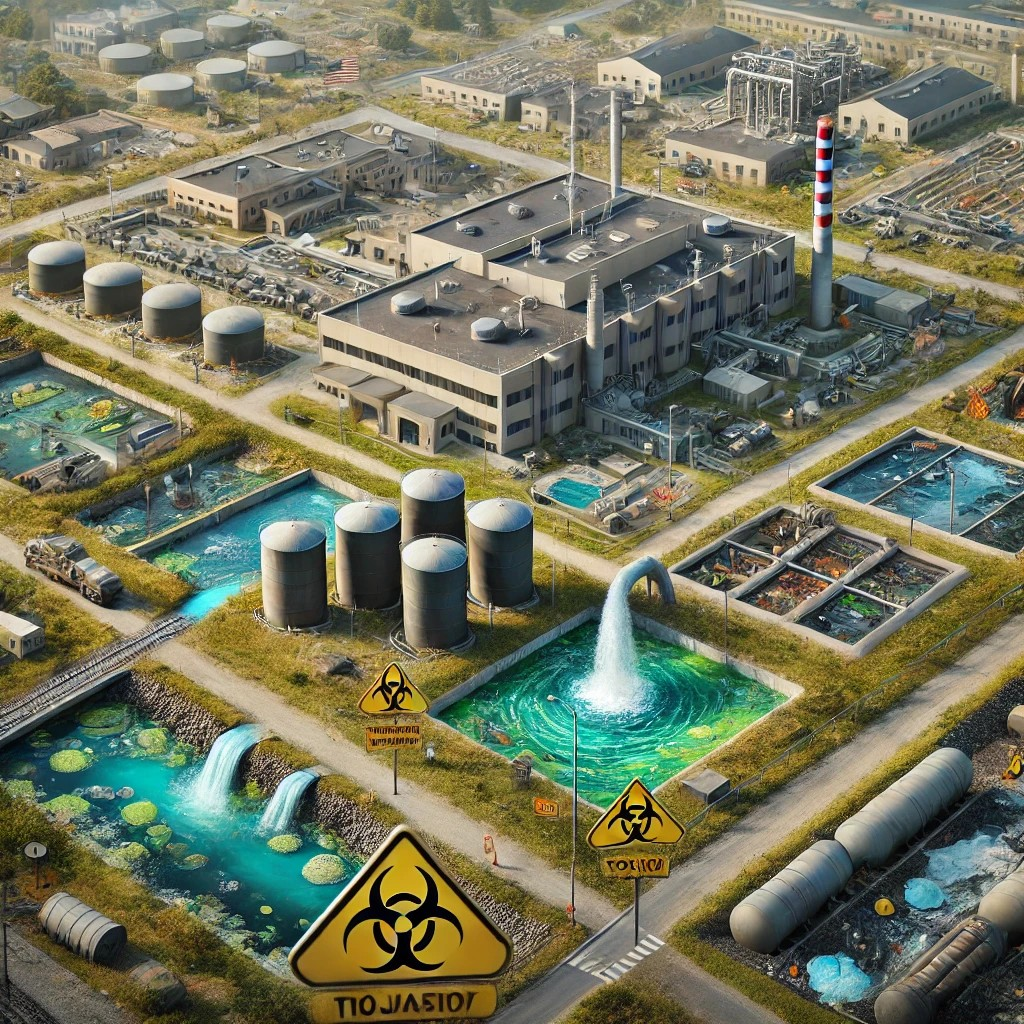The water contamination at Camp Lejeune, a U.S. Marine Corps base in North Carolina, has caused significant harm to many military personnel and their families. For decades, individuals living or working at the base were exposed to toxic chemicals in the drinking water, leading to severe health issues. These chemicals, including benzene, trichloroethylene (TCE), perchloroethylene (PCE), and vinyl chloride, have been linked to various cancers, neurological disorders, and other debilitating conditions. The discovery of these toxic substances in the water at Camp Lejeune has raised concerns about the long-term health risks to the Camp Lejeune population and the necessary steps that need to be taken to address this public health disaster.
The situation at Camp Lejeune is a stark reminder of the importance of environmental safety, particularly on military bases where thousands of people live and work. Understanding the impact of these toxic chemicals on the human body is crucial for those who may be suffering from related health issues. Mass Tort America is committed to helping individuals navigate the legal complexities surrounding Camp Lejeune’s water contamination, providing the support needed to seek justice and compensation for their suffering.
History Of The Camp Lejeune Water Contamination
The contamination at Camp Lejeune began in the 1950s and continued until the mid-1980s. During this time, hazardous chemicals from nearby industrial activities, such as an off-base dry cleaner and improper disposal of waste, seeped into the groundwater. This resulted in the contamination of water supplies, including the Hadnot Point water system and Holcomb Boulevard water system, which provided drinking water to military personnel, their families, and civilian workers. Despite growing concerns and mounting evidence of water contamination, it wasn’t until the early 1980s that testing revealed the extent of the pollution. By then, thousands of people had already been exposed to contaminated drinking water.
The primary contaminants found in the water at Camp Lejeune included trichloroethylene (TCE), a solvent used to clean metal parts; perchloroethylene (PCE), a dry-cleaning agent; benzene, a component of gasoline; and vinyl chloride, used in the production of PVC pipes. These volatile organic compounds are known to be carcinogenic and have been linked to a wide range of health problems, including various forms of cancer, reproductive issues, and birth defects. The prolonged exposure to these and other chemicals and toxins has resulted in a tragic legacy of illness and suffering for many who lived and worked at the base during the contamination period.
The discovery of the contamination led to numerous studies and investigations, confirming the connection between the toxins in the water and the health problems experienced by those exposed. In 2012, the U.S. government enacted the Honoring America’s Veterans and Caring for Camp Lejeune Families Act, which provided healthcare benefits to affected veterans and their families. However, the struggle for justice continues, as many victims seek compensation for the harm they have endured through initiatives like the Camp Lejeune Justice Act.
Health Effects Of Camp Lejeune’s Contaminated Drinking Water
The health effects of the chemicals found in Camp Lejeune’s contaminated water supply are severe and far-reaching. Trichloroethylene (TCE) and perchloroethylene (PCE), both industrial solvents, are particularly harmful to the central nervous system, liver, and kidneys. Long-term exposure to these toxic chemicals has been linked to several types of cancer, including kidney cancer, liver cancer, breast cancer, and adult leukemia. Benzene, another toxic chemical present in the water, is a known carcinogen that affects bone marrow, leading to blood disorders such as leukemia and aplastic anemia.
In addition to cancer, the toxic substances in Camp Lejeune’s water have been associated with a range of other serious health conditions. These include neurological disorders, immune system deficiencies, and reproductive issues. For instance, exposure to TCE and PCE during pregnancy has been linked to an increased risk of birth defects and developmental problems in children. Furthermore, the presence of vinyl chloride in the water, a chemical used in plastic production, poses additional risks, including liver damage and an increased likelihood of developing liver cancer.
The impact of these health issues extends beyond those who were directly exposed to the contaminated water. Many of the health conditions caused by these toxins are chronic and require long-term medical care. The financial burden of ongoing treatment, combined with the physical and emotional toll of dealing with serious illness, has left many families struggling. Understanding the full extent of the health effects caused by the water contamination is essential for those seeking compensation and justice through programs like the Veterans Affairs and disability compensation.
Environmental Impact And Response To Camp Lejeune Water Contamination
The environmental impact of the contamination at Camp Lejeune extends beyond the immediate health effects on residents and workers. The chemicals released into the groundwater have had long-lasting effects on the surrounding ecosystem. The pollutants not only affected human health but also harmed local wildlife, soil, and water bodies. The presence of toxic chemicals, including other contaminants such as vinyl chloride and benzene, in the environment has disrupted the natural balance, leading to a decline in local biodiversity and the degradation of natural resources.
The Environmental Protection Agency (EPA) has been involved in the cleanup efforts, addressing the contamination at Camp Lejeune and ensuring that the affected water supply systems are remediated. The contamination of water at Camp Lejeune highlights the broader issue of environmental mismanagement on military bases. The improper disposal of hazardous waste, including from underground storage tanks, and the lack of adequate environmental safeguards have had severe consequences. The environmental damage caused by the contamination of contaminated wells at Camp Lejeune serves as a cautionary tale for other military installations and industrial sites across the country.
Efforts to remediate the environmental damage at Camp Lejeune have been ongoing, but the process is complex and costly. Cleaning up the contaminated groundwater and restoring the ecosystem to its original state will take many years, if not decades. The environmental impact of the contamination serves as a stark reminder of the importance of responsible environmental stewardship and the need for ongoing vigilance to protect our natural resources.
The Role Of The Veterans Affairs In Addressing Health Problems
The Department of Veterans Affairs (VA) plays a crucial role in providing healthcare benefits to veterans and their families affected by the water contamination at Camp Lejeune. The VA has established a program to provide health care benefits to veterans who served at Camp Lejeune between August 1, 1953, and December 31, 1987, and who were potentially exposed to the contaminated drinking water. This program covers a range of health conditions associated with the exposure to toxic chemicals, including kidney cancer, fatty liver disease, cancer, and neurobehavioral effects.
The VA’s health care benefits program also extends to family members of veterans who lived at Camp Lejeune during the contamination period. These benefits cover the costs of medical care for specific conditions linked to the exposure to contaminated water supplies. However, navigating the VA’s healthcare system can be challenging, and many veterans and their families face difficulties in accessing the benefits they are entitled to. The VA’s efforts to address the health problems caused by the Camp Lejeune water contamination are ongoing, with a focus on providing comprehensive support to those affected.
Despite the VA’s efforts, many affected individuals continue to struggle with the long-term health effects of the contamination. The financial burden of healthcare expenses, combined with the emotional toll of dealing with serious illness, has left many families in a precarious position. Ensuring that veterans and their families receive the care and support they need is essential to addressing the legacy of the Camp Lejeune water contamination.
Scientific Research And The National Academies’ Involvement
Scientific research has been critical in understanding the full extent of the Camp Lejeune water contamination and its impact on human health. The National Academies, including the National Research Council and the National Academy of Medicine, have conducted extensive studies to assess the health risks associated with exposure to the contaminated drinking water at Camp Lejeune. These studies have provided valuable scientific evidence to support the claims of those affected and have been instrumental in assessing potential health effects and shaping the legal and legislative response to the contamination.
The findings of these studies have established a clear link between exposure to the contaminated water at Camp Lejeune and a range of serious health conditions, including adult leukemia, kidney cancer, liver cancer, and other myelodysplastic syndromes. This scientific evidence has been crucial in supporting the claims of veterans and their families who have suffered as a result of the contamination. The research conducted by the National Academies has also informed the development of policies and programs designed to provide healthcare and compensation to those affected by the contamination.
The involvement of the National Academies has also highlighted the need for ongoing research to fully understand the long-term health effects of exposure to the toxic chemicals found in the water at Camp Lejeune. Continued scientific investigation of chemical contaminants is essential to ensure that the affected individuals receive the care and support they need and that future generations are protected from similar environmental hazards.
The Legal Battle For Camp Lejeune Victims
The legal battle for justice and compensation for the victims of Camp Lejeune’s water contamination is ongoing. Many affected individuals have filed lawsuits against the federal government, seeking damages for the harm caused by the toxic chemicals. These lawsuits, often filed in the Eastern District courts, are complex, involving extensive medical evidence and the need to prove a direct link between exposure to the contaminated water and the health problems experienced. Despite the challenges, many victims have successfully obtained compensation, though the process can be lengthy and difficult.
One of the key legal challenges has been the statute of limitations, which limits the time frame in which victims can file a lawsuit. In many cases, the full extent of the adverse health effects caused by the contamination did not become apparent until years or even decades after exposure. This has led to calls for changes in the law, such as those proposed in the Camp Lejeune Justice Act, to allow victims more time to seek justice. Legal representatives and law firms specializing in toxic tort cases have played a crucial role in advocating for these changes and helping victims navigate the complex legal system.
The ongoing legal battles surrounding the Camp Lejeune water contamination have broader implications for environmental law and policy. The challenges faced by victims in these cases have highlighted the need for stronger protections for individuals affected by environmental contamination and for more robust enforcement of environmental regulations. The legal precedents set by these cases continue to shape the landscape of environmental law and provide important lessons for future cases.
The Role Of The Environmental Protection Agency (EPA) In Cleanup Efforts
The Environmental Protection Agency (EPA) has been instrumental in the cleanup efforts at Camp Lejeune, working to address the contamination of the water supply systems and water treatment plants that served the Marine Corps base. The EPA’s involvement began after the extent of the contamination was revealed, and the agency has since overseen the remediation of the contaminated water supplies, including the Hadnot Point and Holcomb Boulevard water systems. The EPA’s efforts have focused on removing the toxic chemicals from the groundwater and preventing further contamination of the water supplies.
The cleanup process has involved the removal of underground storage tanks and the treatment of contaminated water to ensure that it meets safety standards. The EPA has also worked with other agencies, including the Department of Defense, to monitor the progress of the cleanup and ensure that the affected water supplies are safe for consumption. The agency’s efforts have been crucial in mitigating the environmental damage caused by the contamination and protecting the health of those living and working at Camp Lejeune.
Despite the progress made, the cleanup of the water at Camp Lejeune is a long-term effort that will require ongoing monitoring and remediation. The EPA’s role in addressing the contamination is a testament to the importance of strong environmental regulations and the need for vigilance in protecting our natural resources. The agency’s work at Camp Lejeune serves as a reminder of the potential consequences of environmental mismanagement and the critical role of government agencies in addressing these issues.
Impact On Camp Lejeune Veterans And Their Families
The impact of the water contamination at Camp Lejeune on veterans and their families has been profound. Many veterans who served at the Marine Corps base during the contamination period have suffered from serious health conditions, including kidney cancer, liver cancer, and other diseases linked to exposure to the toxic chemicals in the drinking water. The health risks associated with the contamination have also affected family members who lived on the base, leading to a range of health problems that have had a lasting impact on their lives.
The financial burden of dealing with these health issues has been significant for many veterans and their families. The costs of medical treatment, combined with the loss of income due to illness, have placed a heavy strain on those affected. While the Veterans Affairs (VA) provides health care benefits to veterans and their families affected by the contamination, these benefits do not always cover all the expenses associated with treating the conditions caused by the contaminated water. This has left many families struggling to cope with the financial and emotional toll of dealing with serious illness.
The ongoing efforts to support Camp Lejeune veterans and their families are critical in addressing the impact of the contamination. Programs that provide paid health care expenses and disability compensation are essential in helping those affected to manage their health conditions and rebuild their lives. The experiences of Camp Lejeune veterans and their families underscore the importance of ensuring that those who serve our country are protected from environmental hazards and receive the care and support they need when their health is compromised.
The Role Of National Guard Members And Other Military Personnel
The water contamination at Camp Lejeune has not only affected active-duty Marines and their families but also National Guard members and other military personnel who were stationed at the base during the contamination period. These individuals were exposed to the same toxic chemicals in the water supply systems and have suffered from similar health problems as those who lived on the base. The impact of the contamination on National Guard members and other military personnel has highlighted the need for comprehensive support for all individuals affected by the contamination, regardless of their service status.
National Guard members and other military personnel who were exposed to the contaminated water at Camp Lejeune may be eligible for the same health care benefits and disability compensation as active-duty Marines and their families. However, navigating the process of obtaining these benefits can be challenging, particularly for those who served in a different capacity than active-duty military personnel. The VA and other agencies are working to ensure that all individuals affected by the contamination receive the care and support they need.
The experiences of National Guard members and other military personnel affected by the Camp Lejeune water contamination underscore the importance of ensuring that all members of the military community are protected from environmental hazards. The ongoing efforts to support these individuals are essential in addressing the long-term impact of the contamination and ensuring that they receive the justice and compensation they deserve.
The Future Of Camp Lejeune And Similar Cases
The future of Camp Lejeune and the ongoing efforts to address the water contamination will have significant implications for similar cases in the future. The lessons learned from the Camp Lejeune contamination will be critical in shaping future environmental regulations, legal strategies, and government responses to environmental disasters. The case has highlighted the importance of transparency, accountability, and swift action in addressing environmental contamination, particularly on military bases.
One of the key challenges for the future will be ensuring that the victims of the Camp Lejeune contamination receive the support and compensation they need. This will require ongoing legal efforts, continued advocacy, and a commitment from the federal government to provide comprehensive healthcare and financial assistance to those affected. The future of Camp Lejeune will also depend on the success of the environmental cleanup efforts and the restoration of the ecosystem.
The lessons learned from Camp Lejeune will also be important in preventing similar incidents in the future. The case corps base camp lejeune has underscored the need for stronger environmental protections, better enforcement of regulations, and greater accountability for those responsible for environmental contamination. By applying these lessons, we can help to ensure that future generations are protected from the devastating effects of environmental contamination.
Why Choose Mass Tort America For Your Case?
Choosing the right legal representation is vital for anyone affected by the Camp Lejeune water contamination. Mass Tort America has the experience and resources needed to handle complex cases like these, ensuring that clients receive the support and guidance they need throughout the legal process. Our team is dedicated to fighting for the rights of those harmed by environmental contamination, and we work tirelessly to secure the compensation our clients deserve. With our extensive knowledge of the law and commitment to our clients, Mass Tort America is well-equipped to handle even the most challenging cases.
Mass Tort America understands the unique challenges faced by victims of Camp Lejeune’s water contamination. Our Concierge Team is available to help coordinate everything, making the legal process as smooth as possible for our clients. We may be able to obtain compensation that can help cover medical expenses, lost wages, and other costs associated with the health problems caused by the contamination. If you or a loved one has been affected by Camp Lejeune’s water contamination, don’t hesitate to reach out. Contact us today at 800-356-4338 or visit our contact form at https://masstortamerica.com/contact/ to learn more about how we can help.



















